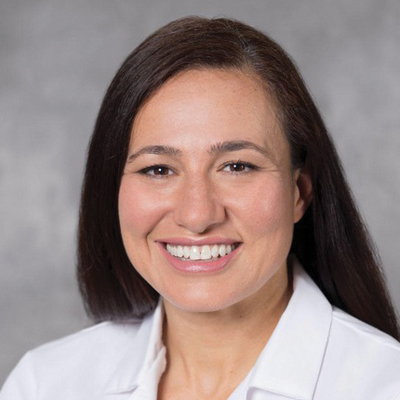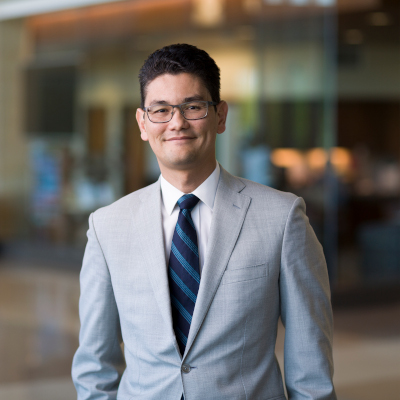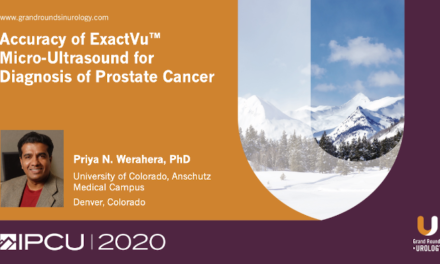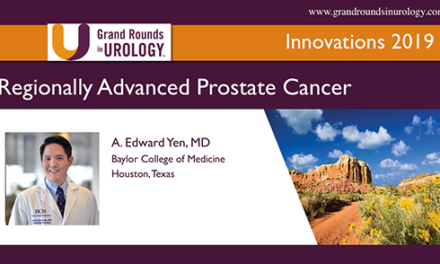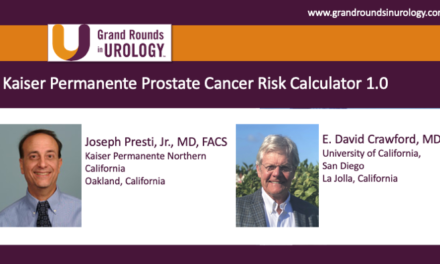Rana R. McKay, MD, and Alan H. Bryce, MD, presented “Point-Counterpoint: Management of mCRPC” during the 29th Annual Perspectives in Urology: Point-Counterpoint, in November 2021, in Coronado Island, San Diego, California.
How to cite: McKay, Rana R., and Bryce, Alan H. “Point-Counterpoint: Management of mCRPC.” November 2021. Accessed May 2025. https://grandroundsinurology.com/point-counterpoint-management-of-mcrpc/
Point-Counterpoint: Management of mCRPC
Rana R. McKay, MD, Associate Professor of Medicine at the University of California, San Diego, and Co-Leader of the Genitourinary Oncology Disease Team at the Moores Cancer Center, and Alan H. Bryce, MD, Medical Director of the Genomic Oncology Clinic at Mayo Clinic Arizona in Scottsdale, debate whether to treat metastatic castration-resistant prostate cancer (mCRPC).
Taking the pro position, Dr. McKay presents on why physicians need to treat mCRPC, as well as come up with additional treatment options to help improve survival for mCRPC patients. She discusses the goals of mCRPC treatment, improved quality of life and overall survival, and displays a chart that summarizes the current landscape of treatment for advanced prostate cancer as she details how androgen receptor (AR) targeting agents are enhancing treatment. Dr. McKay reviews FDA-approved agents in mCRPC, stating that the vast majority both improve overall survival and quality of life. She specifically states that the agents, outside of pembrolizumab, rucaparib, and sipuleucel-T, can potentially increase overall survival by 53.6 months and improve cancer-associated pain, disease-related urinary symptoms, and symptomatic skeletal events. Dr. McKay then shows a graph displaying mCRPC treatment in a clinical practice, suggesting that mCRPC is grossly undertreated based on the vast majority of patients not going beyond first-line treatment. She states that there is little reliable data on the cost effectiveness of treatment and concludes that mCRPC should be treated based on data showing that treatments improve overall survival and quality of life.
Taking the con position, Dr. Bryce makes an argument against treating mCRPC based on the differences between trial and real-world populations, and the challenges of extreme treatments. Dr. Bryce cites quality of life post-treatment, financial toxicity, and patient-centric treatment as cons of mCRPC treatment. He shows a graph of mCRPC treatment management in clinical practice and states that the rapid drop off after first-line therapy could be caused by patient drop outs instead of undertreatment. Dr. Bryce discusses the mCRPC treatment process in detail, focusing on how after the first line of therapy, treatment options become much more extreme and mostly consist of chemo, and most patients only have about a year left to live if they are beyond second-line treatment. He uses a case study of a 73-year-old patient to show how real-world patients can differ from selected trial patients due to how patient selection leads to optimized outcomes. Dr. Bryce reviews data showing that 20% of patients report financial toxicity, something which is associated with anxiety and depression. He concludes that clinicians should exercise prudent judgment in deciding whether or not to treat patients with advanced cancer due to trials testing beyond third-line therapy not reflecting real-world patients and financial toxicity being a significant issue.
About the 29th Annual Perspectives in Urology: Point Counterpoint conference:
Presented by Program Chair and Grand Rounds in Urology Editor-in-Chief E. David Crawford, MD, this conference brought together leading experts in urology, medical oncology, and radiation oncology to discuss and debate the latest topics in genitourinary cancers, primarily prostate cancer and bladder cancer. This interactive conference offered topical lectures, pro/con debates, interesting-case presentations, interactive panel discussions, and interactive audience and faculty networking.
About the Authors
Rana R. McKay, MD
Rana R. McKay, MD, is an Associate Professor of Medicine at the University of California, San Diego, and Co-Leader of the Genitourinary Oncology Disease Team at the Moores Cancer Center. She is a board-certified medical oncologist who specializes in treating people with urogenital cancers, including bladder, kidney, prostate, and testicular cancer. Her research interests include the design and implementation of clinical trials to advance the treatment of patients with urologic cancers. She serves as the Principal Investigator of several early phase trials in kidney and prostate cancer. As a clinical investigator, she is committed to advancements that will improve the lives of individuals with cancer. Furthermore, she is interested in understanding mechanisms of response and resistance to specific cancer therapies. Her work has appeared in peer- reviewed publications such as Nature, The Lancet, The Journal of Clinical Oncology, Clinical Cancer Research, Cancer, among others. Dr. McKay earned her medical degree at the University of Florida College of Medicine before completing her residency in Internal Medicine at Johns Hopkins Hospital. She also completed a fellowship in Oncology/Hematology at the Dana-Farber Cancer Institute of Harvard Medical School. She went on to serve as an Assistant Professor at Harvard Medical School and a medical oncologist at Dana-Farber/Brigham and Women’s Cancer Center in Boston before joining UC San Diego Health.
Alan H. Bryce, MD
Alan H. Bryce, MD, is a Consultant in the Division of Hematology and Oncology, Department of Internal Medicine at Mayo Clinic in Arizona and serves as Chair of the division. He is also chair of the Genitourinary Disease Group. He holds the academic rank of Associate Professor of Medicine, Mayo Clinic College of Medicine. He joined the staff of Mayo Clinic in 2011. Dr. Bryce earned his BS degree in Biochemistry at the University of California, Los Angeles, and his MD at Finch University of Health Sciences, Chicago Medical School. He completed a residency in internal medicine and a fellowship and chief fellowship in hematology/oncology at Mayo Graduate School of Medicine. Dr. Bryce’s primary focus is on prostate cancer and testicular cancer. His research centers on developing new approaches to the treatment and cure of cancer. This includes developing new treatments through clinical trials and better understanding of cancer evolution through interrogation of the genetic mutations of individual cancer cells. His work includes studies of immunotherapy, genetically targeted therapies, hormone therapy, injectable radiotherapy, and chemotherapy. Dr. Bryce is committed to health equity and patient-centered care. He believes that individualized medicine starts with tailoring all treatment to the patient’s goals and values.
ABOUT THE AUTHOR
Alan H. Bryce, MD, is a medical oncologist and chief clinical officer at City of Hope in Phoenix, Arizona. Dr. Bryce holds an appointment as a professor with the Department of Medical Oncology & Therapeutics Research, with City of Hope, as well as an appointment as a professor of Molecular Medicine at Translational Genomics Research Institute (TGen), which is also part of City of Hope.
Prior to joining City of Hope, Dr. Bryce spent 12 years at the Mayo Clinic in Phoenix, where he served as chair of the Division of Hematology and Medical Oncology, as well as Director of the Mayo Clinic Arizona Comprehensive Cancer Center. Dr. Bryce received his medical degree from the Chicago Medical School, and then completed an internal medicine residency and a hematology and oncology fellowship at the Mayo Clinic in Rochester, Minnesota. During his time at Mayo, Dr. Bryce served as an international co-principal investigator on multiple clinical trials for prostate cancer, with his research focused on cancer genetics, novel therapies and immunotherapeutic approaches.

